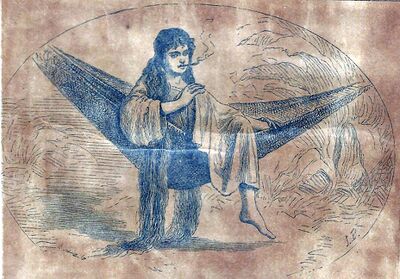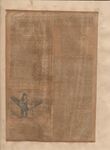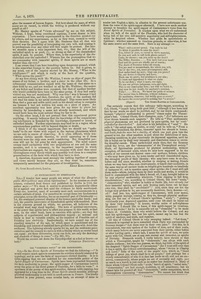HPB-SB-4-121: Difference between revisions
mNo edit summary |
mNo edit summary |
||
| Line 121: | Line 121: | ||
All this of Colonel Olcott is very sweeping indeed. “Let them,” Bismarck is reported to have remarked when Paris was surrounded by German troops—“Let them stew in their own juice.” But this, be it remembered, was only spoken of the bodies of men, not of their souls, which many believe are never separated from their spirits, either before or after leaving earth; which last, I mean the ''spirits ''of men, we quite agree with Col. Olcott, are at any rate eternal and immortal, as sparks of Divinity. Bismarck would, I verily believe, have shrunk at that which a Theosophist, taught by “elementals,” can allege with such infinite coolness; but who can possess, we think, but little of the spirit of the despised “Spirit-Rapper of Carcassonne” (for I must still aver that it has a spirit, the Colonel notwithstanding), whose “device is Charity and Love;” little of the spirit of the angels’ text, which is, “Good tidings of great joy, which shall be to all people;” and perhaps but a cloudy remembrance of who it is that has made us all, and not we our-selves, consequently, whose people we are of necessity and right, just as much as a watch is just such as its maker has fashioned it. Many of those whom Colonel Olcott calls “souls,” bereft of spirit, “astral men,” “elementaries,” are bad enough, doubtless, in all conscience; but we cannot take for granted all that “elementals,” under compulsion, teach Theosophists concerning “elementaries.” We cannot but think that {{Style S-HPB SB. Continues on |4-122}} | All this of Colonel Olcott is very sweeping indeed. “Let them,” Bismarck is reported to have remarked when Paris was surrounded by German troops—“Let them stew in their own juice.” But this, be it remembered, was only spoken of the bodies of men, not of their souls, which many believe are never separated from their spirits, either before or after leaving earth; which last, I mean the ''spirits ''of men, we quite agree with Col. Olcott, are at any rate eternal and immortal, as sparks of Divinity. Bismarck would, I verily believe, have shrunk at that which a Theosophist, taught by “elementals,” can allege with such infinite coolness; but who can possess, we think, but little of the spirit of the despised “Spirit-Rapper of Carcassonne” (for I must still aver that it has a spirit, the Colonel notwithstanding), whose “device is Charity and Love;” little of the spirit of the angels’ text, which is, “Good tidings of great joy, which shall be to all people;” and perhaps but a cloudy remembrance of who it is that has made us all, and not we our-selves, consequently, whose people we are of necessity and right, just as much as a watch is just such as its maker has fashioned it. Many of those whom Colonel Olcott calls “souls,” bereft of spirit, “astral men,” “elementaries,” are bad enough, doubtless, in all conscience; but we cannot take for granted all that “elementals,” under compulsion, teach Theosophists concerning “elementaries.” We cannot but think that {{Style S-HPB SB. Continues on |4-122}} | ||
{{Footnotes start}} | |||
<nowiki>*</nowiki> Forward. | |||
{{Footnotes end}} | |||
{{HPB-SB-footer-footnotes}} | {{HPB-SB-footer-footnotes}} | ||
Revision as of 12:41, 8 February 2024
< In Mr. Massey's excellent comments (continued from page 4-120) >
after the manner of human fingers. But how about the cases, of which many are on record, in which the writing is produced without any pencil at all?
Mr. Massey speaks of “views advanced” by me on this subject. Without, I hope, being considered captious, I must demur to this expression. I have merely experimented in the direction pointed out by others, and my experiments, as far as they went, seemed to verify their theories. But I agree with Mr. Simmons that all that was proved was the possibility of interposing our own will, and causing it to predominate over any other will that might be present. But here we stumble upon a very important fact, viz., that the will of the embodied spirit is as good, i.e,, as strong as that of the disembodied spirit, if such be present. Where then, is the superiority of the disembodied over the embodied 1 Wherein lies the presumption that we are communing with immortal spirits, if those spirits are so much weaker than our own?
I am aware that I am here trenching upon dangerous ground, which is also somewhat foreign to the question before us. But it grows, to my mind, out of the inquiry started by Mr. Massey, “What is the intelligence?” and which is really at the back of the question, “What moves the pencil?”
At my first sitting with Mr. Watkins, I wrote on slips of paper the names of my father, a brother, and a sister in the other life. In a subsequent communication signed with the 'name of that sister on a slate held by me, and not touched at all by Mr. Watkins; the names of my father and brother were repeated, but that of another brother who would probably have been in the same group, if they had really visited me, was not mentioned. Why was this? was it because I had not mentioned him, and that, therefore, the spirit of the medium did not read his name in my astral surroundings? This seems more likely than that a pure and noble spirit such as his should refuse to recognise me because I had not written his name on a piece of paper. An excellent opportunity was here given for my sister to prove her identity by introducing a name not already mentioned, and which would have been the most natural thing for her to do.
On the other hand, I do not pretend that this experiment proves anything. It merely indicates that the knowledge of the communicating intelligence is bounded by the knowledge, expressed or latent, of embodied minds. Further experiments may land us in a region whose supermundane position will be beyond dispute or doubt.
I think it of the utmost importance that we should not “make haste” to fix our views with regard to the various phenomena which we are only in course of observing. It is often difficult, while considering certain specific theories, to avoid appearing as if those theories were the only ones worth considering. But thoughtful persons will not be led away by such appearances. The mind cannot occupy itself exclusively with two propositions at one and the same moment, and it is necessary, in the important inquiry in which Spiritualists are engaged, for them to examine with more than usual thoroughness every theory which may possibly lead them to a complete generalisation of the facts with which they have to deal.
I, therefore, deprecate most strongly the tacking together of names and views merely because they are, as they must be, sometimes temporarily associated for the purposes of investigation.
38, Great Russell-street, London

The “Spiritless Souls” of the Theosophists
Sir.—In the Revue Spirite of November we find the following :—“It would require much space to enumerate the services already rendered by typtology, and to note the facts of importance elicited thereby. It is to table-rapping that we are indebted for the remarkable poetry of the Spirit-Rapper of Carcassonne. Spirits have been reproached frequently for their mediocrity in prose; the spirit-rapper of Carcassonne carried away the prize at the floral games of Toulouse, for a fable in verse.” A specimen of the poetry of this spirit versifier, through table-rapping, has appeared for a long time in the Revue Spirite almost monthly, although physical mediumship is not held in much esteem in France. You kindly inserted in your journal, some months back, an attempt of mine to render into English a fable, in allusion to the present unfortunate war, from the verse of the spirit-rapper aforesaid. I have now made another attempt to translate the spirit-rapper of Carcassonne’s verse from the Revue Spirite of November. It touches upon what we all understand when we talk of the spirit of the Pharisee, who had the character of being full of his own self-assertive superiority and self-righteousness, while he despised others. Whether that pride be materialistic or Spiritual; whether assumed on vicarious grounds, or otherwise, it has the same source and the same fruit. Here is my attempt:—
What! said a savant proud. Can fools be led The Spirit-Rapper of Carcassonne.
|
One certainly regrets that this unhappy table-rapper, according to Col. Olcott, “cannot bring forth good fruit;” although it has been said that by our words we shall be justified, and by our words condemned; because “physical mediumship in general” comes under the Theosophist’s ban. Colonel Olcott, their champion, says, “Evil influences are alone drawn towards such magnets.” He tells us “That mediumistic physical phenomena are not produced by pure spirits, but by ‘souls’ embodied or disembodied.” And what is his definition of “soul”? He calls it “the astral man, or double, or soul,” and he tells us, “From a being thus brutalised, the divine, immortal spirit has shrunk in horror, and death finds the man but a duality, of which one part goes into the ground to rot, the other wanders in and about the habitations of men, obsessing sensitives, to glut vicariously its depraved appetites, until its life is burnt out by their very intensity, and dissolution comes to crown the dreadful career. These earth-bound souls then, that the Romans called the larvae, are the ‘elementaries’of the Theosophical society.” Mark, all Spiritualism produced by physical mediumship, without exception, all deceased souls, whom we may have supposed to be the spirits of our nearest and dearest ones—our mothers, fathers, children—who may have given us, by some tender and well remembered signs, the strongest proofs of their identity; who may have come to us also, before and did since, uncalled, whether in sleeping or waking, friends whom we may have often seen clairvoyantly, or heard clair-audiently, in the same way as all ancient books on religion give hundreds on hundreds of instances of; not to mention many other spirits—for I must still call them such—whom, judging them by their words and works, it would be hard to contaminate with the felon’s brand, all, I say, brought before us by any physical mediumship whatever, “from rapping to full form manifestations,” are, according to Colonel Olcott, but mere “souls,” “elementaries,” who, whether in bodily or fluidic life, have already lost their immortal spirits, and are only waiting until, burnt out by their own vice, they shall be “annihilated’’! And, since they are not the beings they profess to be, are necessarily deceivers, liars, demons—all, all! And you, too, spirit-rapper of Carcassonne, with your moral, witty, pungent sayings, coming, as they do, through physical medium- ship, are but one of Colonel Olcott’s spiritless “souls”; “glutting vicariously your depraved appetites, until your life shall be burnt out by their very intensity,” in honest, worthy satire of self-righteous Pharisees! I should like to know, if this spirit-rapper be vicarious, who is his rector? for he is assuredly not an “elemental” to be made a slave of. Certainly, those who would believe the Colonel, and say that his spirit-rapper has lost his spirit, cannot say he has lost the spirit of candour, and truth, and repartee.
All this of Colonel Olcott is very sweeping indeed. “Let them,” Bismarck is reported to have remarked when Paris was surrounded by German troops—“Let them stew in their own juice.” But this, be it remembered, was only spoken of the bodies of men, not of their souls, which many believe are never separated from their spirits, either before or after leaving earth; which last, I mean the spirits of men, we quite agree with Col. Olcott, are at any rate eternal and immortal, as sparks of Divinity. Bismarck would, I verily believe, have shrunk at that which a Theosophist, taught by “elementals,” can allege with such infinite coolness; but who can possess, we think, but little of the spirit of the despised “Spirit-Rapper of Carcassonne” (for I must still aver that it has a spirit, the Colonel notwithstanding), whose “device is Charity and Love;” little of the spirit of the angels’ text, which is, “Good tidings of great joy, which shall be to all people;” and perhaps but a cloudy remembrance of who it is that has made us all, and not we our-selves, consequently, whose people we are of necessity and right, just as much as a watch is just such as its maker has fashioned it. Many of those whom Colonel Olcott calls “souls,” bereft of spirit, “astral men,” “elementaries,” are bad enough, doubtless, in all conscience; but we cannot take for granted all that “elementals,” under compulsion, teach Theosophists concerning “elementaries.” We cannot but think that <... continues on page 4-122 >
* Forward.
Editor's notes
-
London Spiritualist, No. 280, January 4, 1878, pp. 9-10


